新概念英语第二册 第59课 In or out (共54张PPT)
文档属性
| 名称 | 新概念英语第二册 第59课 In or out (共54张PPT) | 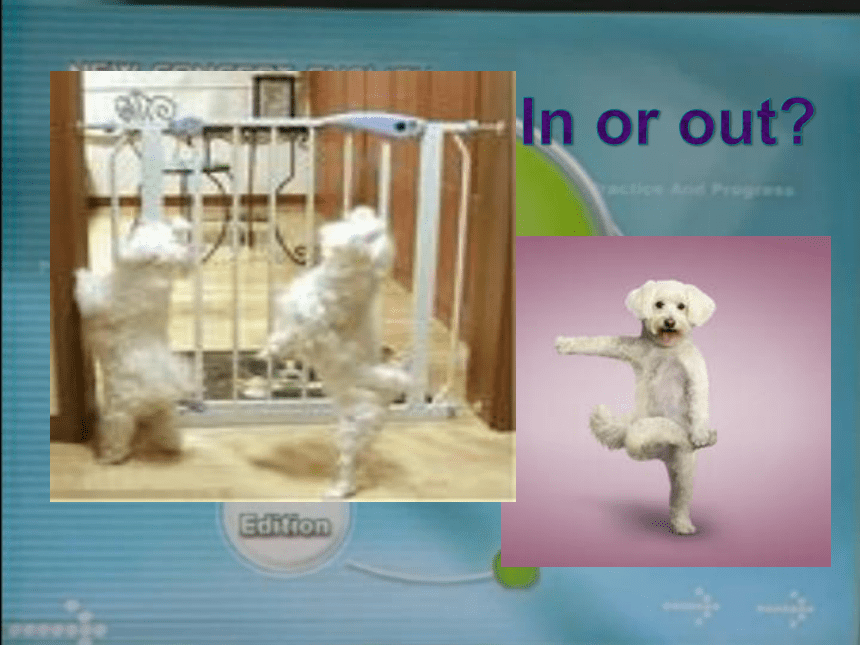 | |
| 格式 | ppt | ||
| 文件大小 | 1.7MB | ||
| 资源类型 | 教案 | ||
| 版本资源 | 新概念英语 | ||
| 科目 | 英语 | ||
| 更新时间 | 2023-10-06 20:12:16 | ||
图片预览

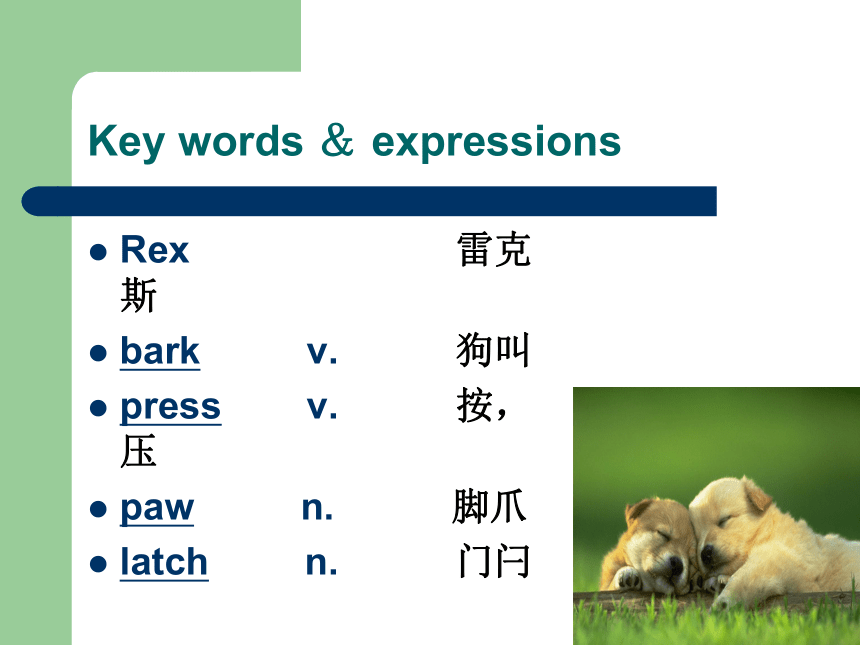
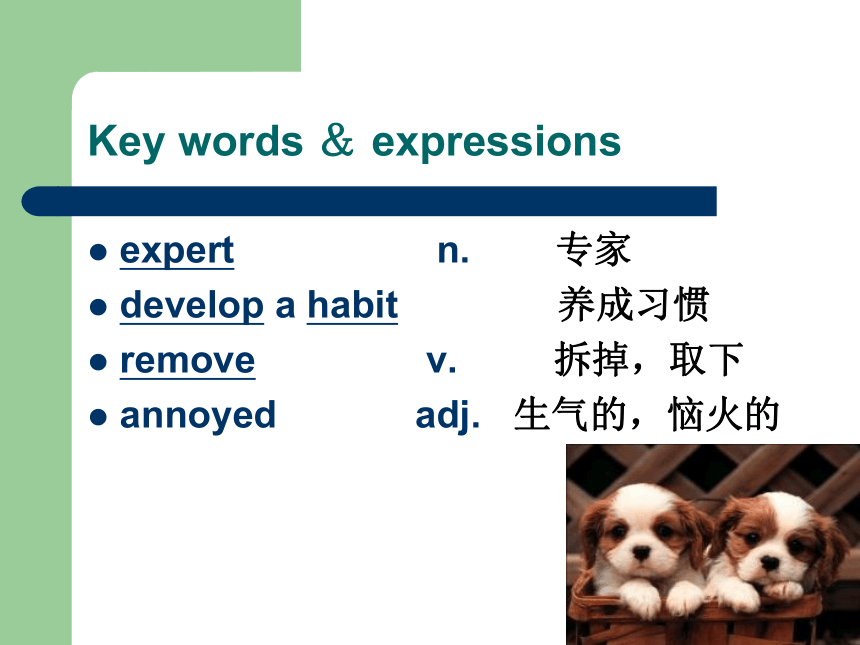
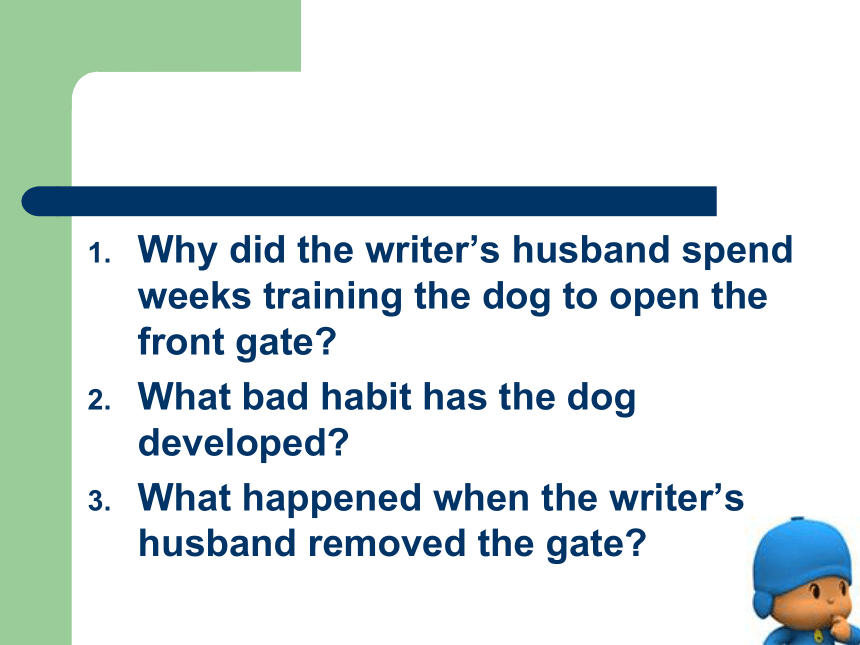
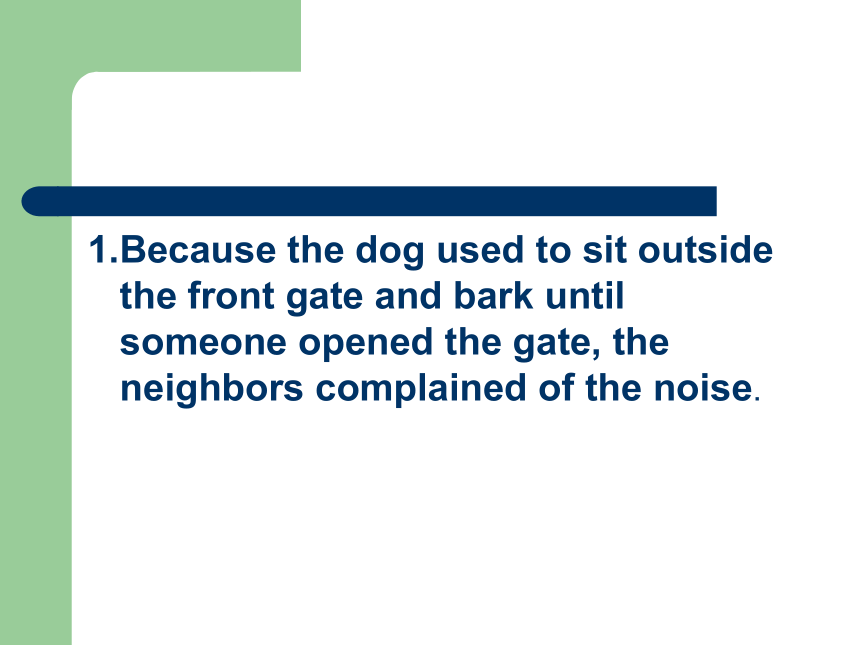
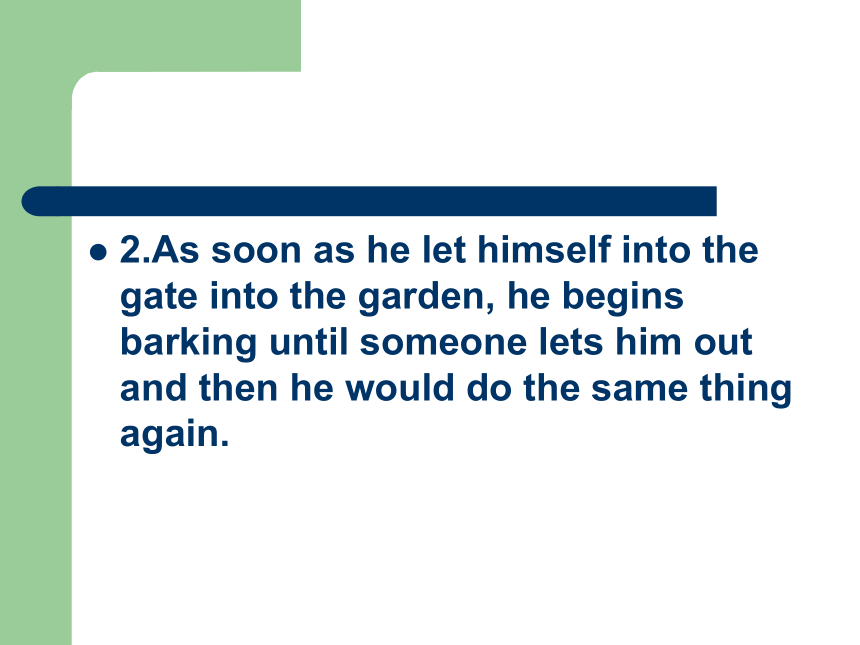
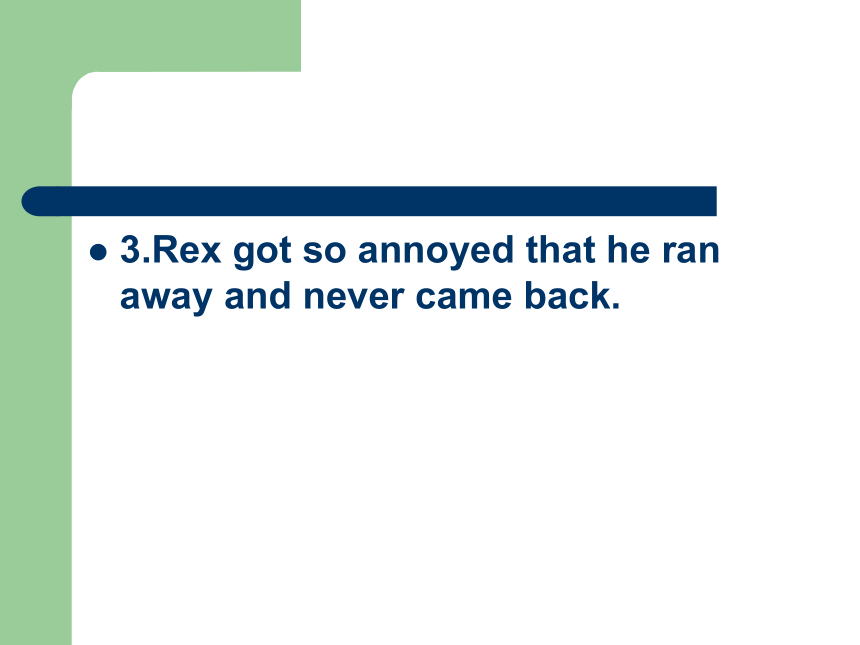
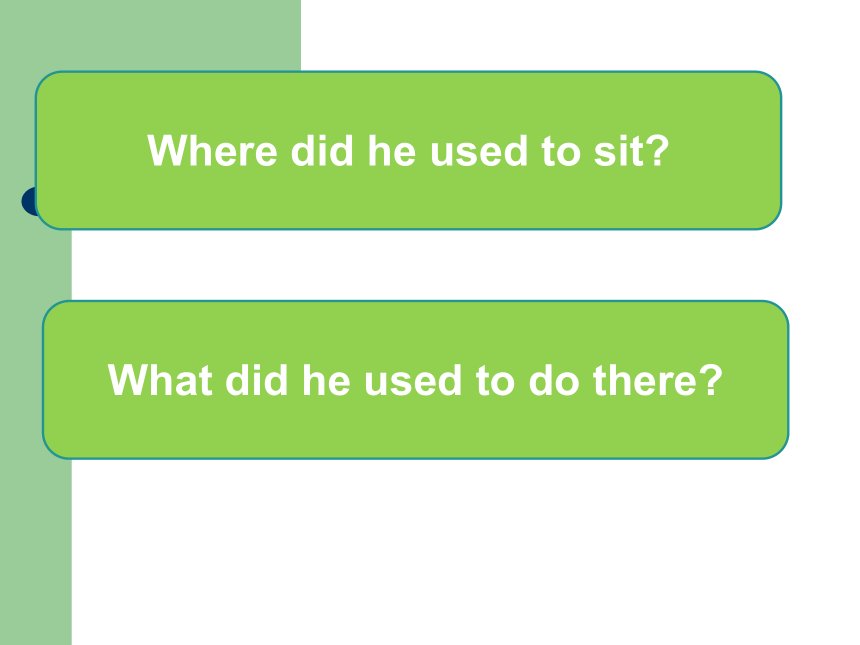
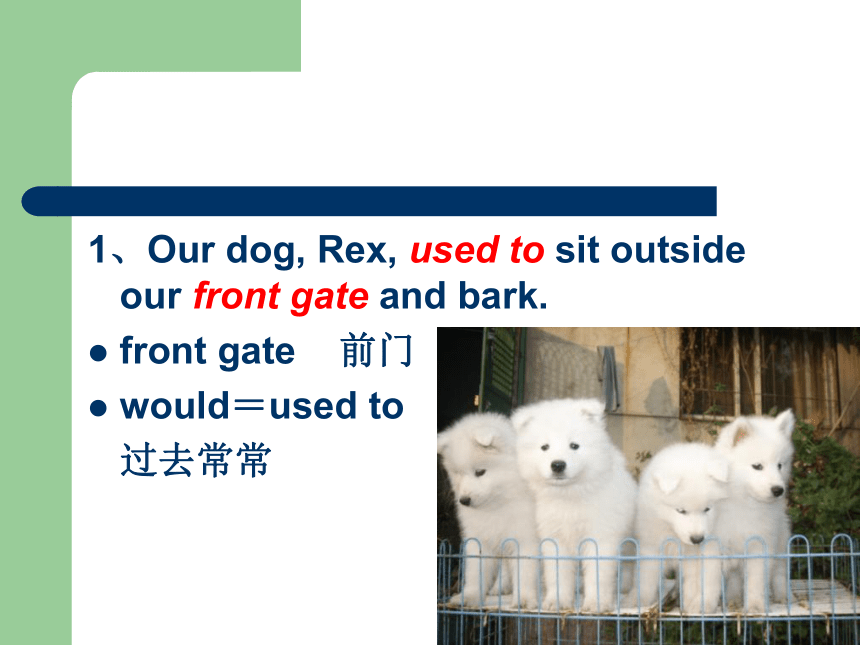
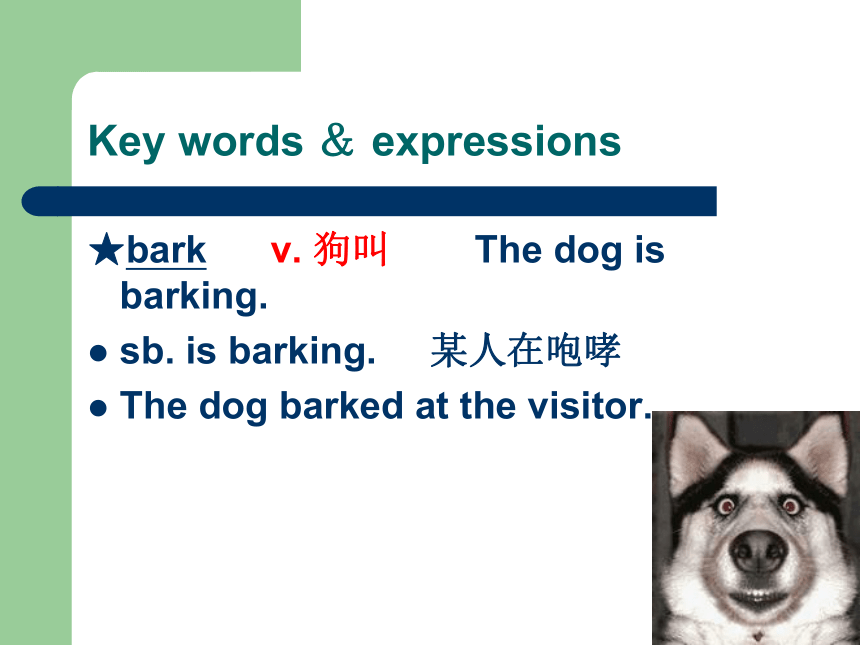
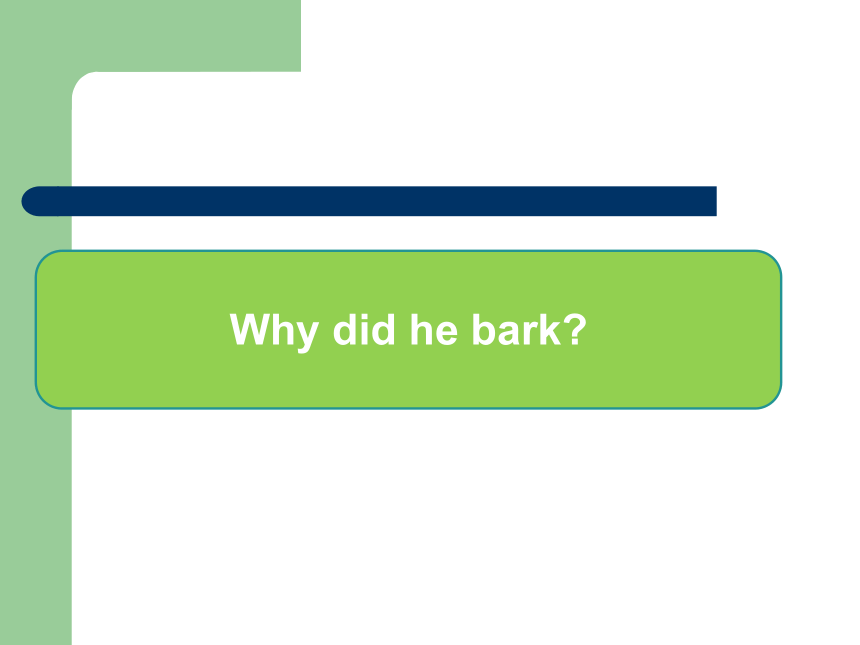
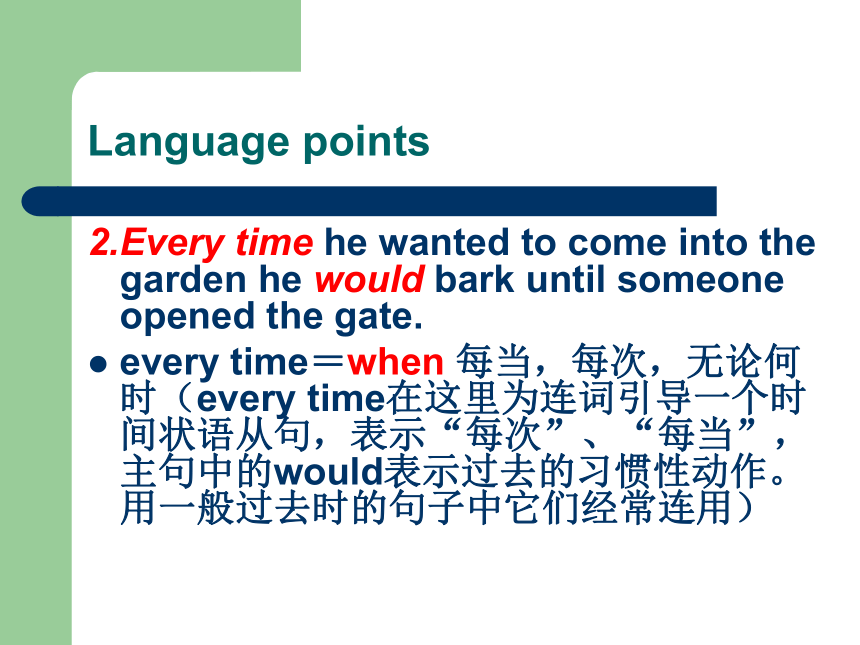
文档简介
(共54张PPT)
Key words & expressions
Rex 雷克斯
bark v. 狗叫
press v. 按,压
paw n. 脚爪
latch n. 门闩
Key words & expressions
expert n. 专家
develop a habit 养成习惯
remove v. 拆掉,取下
annoyed adj. 生气的,恼火的
Why did the writer’s husband spend weeks training the dog to open the front gate
What bad habit has the dog developed
What happened when the writer’s husband removed the gate
1.Because the dog used to sit outside the front gate and bark until someone opened the gate, the neighbors complained of the noise.
2.As soon as he let himself into the gate into the garden, he begins barking until someone lets him out and then he would do the same thing again.
3.Rex got so annoyed that he ran away and never came back.
Where did he used to sit
What did he used to do there
1、Our dog, Rex, used to sit outside our front gate and bark.
front gate 前门
would=used to
过去常常
Key words & expressions
★bark v. 狗叫 The dog is barking.
sb. is barking. 某人在咆哮
The dog barked at the visitor.
Why did he bark
Language points
2.Every time he wanted to come into the garden he would bark until someone opened the gate.
every time=when 每当,每次,无论何时(every time在这里为连词引导一个时间状语从句,表示“每次”、“每当”,主句中的would表示过去的习惯性动作。用一般过去时的句子中它们经常连用)
Exercises:
________________________________________________________________.
我们每次见面都要聊一会儿。
____________________________________________________
他每次来看我们都带一份礼物。
Every time we met, we would talk for a while.
He brought a present every time he came to visit us.
Our dog, Rex, _____ _____ _____ outside our______ gate and______. _____ ______ he______ _____ ______ into the garden, he______ ______ until someone_______ the gate.
Who complained of the noise
What did your husband train him to do
How long did he spend training him
Language points
3、As the neighbors complained of the noise, my husband spent weeks training him to press his paw on the latch to let himself in.
→sb. spend time (in) doing sth./on sth.
花费某段时间去做某事(人作主语)
I spent two weeks (in) reading this book.
He has spent a lot of time on this project.
→It takes sb. some times to do sth. 某事花了某人多少时间(事情做主语)
complain about
1.我花了两个星期来读这本书。
2.他已经在这项目上花了很多时间。
→train sb. to do sth. 训练某人做某事
→press his paw on the latch = press the latch
press the button = press the figure on the button
→let sb. do sth. 让某人做某事
let sb. in 让某人进来 ; let sb. out 让某人出去
let sb. down 让某人失望
1.他打开门让我进去。
2.我们应该刻苦学习,不让父母失望。
He opened the door to let me in.
2. We are supposed to work hard in
order not to let our parents down.
Key words & expressions
★press v. 按, 压
① vt.&vi. 按,挤,压
Can you press that button for me please
②vt. 催促,敦促,竭力劝说
I don’t like to be pressed. 我不喜欢被人催促。
pressure n. 压, 压力, 电压, 压迫, 强制, 紧迫
Key words & expressions
★paw n. 脚爪
The cat’s paw was burnt.
My dog’s paw was bleeding.
cat's paw 被利用的人(由寓言而来)
I don‘t want to be a cat’s paw.
我才不想被人利用 。
Key words & expressions
★latch n. 门闩
latch n. 门闩(庭院,花园中的门闩)
bar n. 门闩(与 latch不同)
You can’t walk in because the door is on the latch.
What did Rex soon become expert at
Language points
4、Rex soon became an expert at opening the gate.
become an expert at doing sth. 成了……能手/专家/权威
Expert常与介词at,in,on,with连用
John is an expert at driving a car.
约翰是开车高手。
She is an expert in flowers.
她是花卉方面的专家。
Sam is an expert on that problem.
萨姆是研究那个问题的权威。
Key words & expressions
★ expert n. 专家,能手
adj. 熟练的,老练的
★ an expert in/ at (doing) sth (某方面的)专家/ 能手
★ be/ become expert in/at (doing) sth.是/成为专家/能手,擅长
【译一译】:
1)他是个老练的司机。
He is an expert in/at driving a car.
= He is expert in/ at driving a car.
2)They are all experts in this field.
他们都是这个领域的行家。
As the neighbours ______ ______ the noise, my husband _______ weeks______ him______ ______ his paw on the latch_____ _____himself____. Rex soon became_____ _____ _____ _____ the gate.
Where were you going last week
Language points
5. However, when I was going out shopping last week, I noticed him in the garden near the gate.
→going out shopping 加了out 强调外出
→去游泳 go swimming
→去钓鱼 go fishing
→去野餐 go picnicking
Why was he barking this week
Language points
6. This time he was barking so that someone would let him out.
→so that表示“为的是……”,引导目的状语从句
1.请大声一点,以便我们能听见你。
2.为了我们不迟到,你能快点吗?
Please speak up so that we can hear you.
Can you hurry up so that we won’t be late
However, When I______ ______ ______ shopping last week, I ______ him in the garden_____ ______ ______. This time he______ ______ so_____ someone would _____ him ______.
What’s he developed since then
Since then, he has developed another bad habit.
从那以后,它养成了另外一种习惯。
4. develop: v. 写出develop 在不同句子中的不同含义
1) He believes that sports can develop mind and body. _______________________
2) We need to develop solar energy even further. _____________________
(使)发展; 使成长,发育
开发(土地、资源、新产品)
4)He developed an interest in music. ________ _______________________________
5)I developed a cold yesterday.________
6) Let’s have these photos developed. ___________________
development: n. with the development of: 随着---的发展
_____________________________________________,____ our country has become a most powerful country in space technology.
培养(习惯、兴趣等)
患(病)
冲洗底片
With the development of the aircraft
technology
Key words & expressions
★develop v. 养成 develop a habit
① vt. &vi. 发展,扩展
The village has developed into a town now.
developing country 发展中国家 ;
developed country 发达国家
V-ed 强调已经,V-ing 强调正在,有时态的区别
boiling water 滚开水 ; boiled water 开水
Key words & expressions
★habit n. 习惯(指个人习惯)
custom n. 风俗,习俗 ;
customs n. 海关 ;
customer n. 顾客
develop a good habit
He slipped into bad habits.
He has the habit of staying up late.
What does he do, as soon as he opens the gate from the outside
As soon as he opens the gate from the outside, he comes into the garden and waits until the gate shuts.
它从外面一把门打开,就走进花园,等着们自动关上。
“一…… 就…….”: as soon as, no sooner… than, hardly/ scarcely…when, the moment/ minute/ instant/ second, immediately/instantly/directly
No sooner/ Hardly had I arrived at the station than/when the train left.
Mother began cooking as soon as/ the second/ directly she got home.
the first/second/ …last time, every/each time, next time, by the time
She would buy something for his grandpa each time she went to see him.
The first time I saw him, I fell in love with him.
trained animals 驯化了的动物
abandoned farms 废弃了的农场
落叶_______________
正在飘落的树叶____________
fallen leaves
falling leaves
What did he do then
Language points
Then he sits and barks until someone lets him out.
然后他就坐下旺旺叫起来,直到有人来把它放出去。
Then加until 引导的时间状语从句,旨在突出时间上的顺延。
然后我抓紧绳子,直到有人把我从悬崖上拉了出去。
Then I held on the rope until someone dragged me up the cliff.
Language points
After this he immediately lets himself in and begins barking again.
出去之后,它又马上把自己放进来,接着再开始叫。
Why did Rex run away
Language points
7、Yesterday my husband removed the gate and Rex got so annoyed we have not seen him since.
so…that…如此…以至于,结果状语从句,可以省略一个词,so 或 that 都可以 .
He was so excited he could not say anything.
since(在句尾) = since then : 从那时起到现在为止,一般与完成时连用。
Key words & expressions
★remove v. 拆掉, 取下
remove sth. from 从……挪走
she saw he had removed his glasses.
He removed the picture from the wall.
被免职;撤去
He was removed from the post.
Key structures and usage
表示目的的几种方式:
to, in order to, so as to, so that, in order that
→My husband spent weeks training him to press his paw on the latch to let himself in.
→This time he was barking so that someone would let him out.
→We start out early in order to avoid traffic.
→I moved to the front of the bus so as to get
a good view of the countryside.
→He left the letter on the table in order that I
might see it.
Key structures and usage
●(1)“So that“以便,使能够”,与in order that 同义,后接从句,引导一个表示目的的状语从句。
Speak clearly so that (in order that) everybody can understand you.
请说清楚一点,这样每个人都可以听懂你的话。
We left early so that (in order that) we could catch the first train.
●(2)so that 也可以引导表示结果的状语从句,主句和从句是原因与结果的关系,做“因此”讲。
It was too cold ,so that we couldn’t work.
天气太冷了,因此我们无法工作。
Key structures and usage
●(3)so that与so---that的区别
so that 可以引导目的的状语从句(有情态动词)或结果状语从句(没有情态动词)(从句子的意思上或根据主句和从句的逻辑关系上去判断);
so---that引导结果状语从句,作“如此--- 以致--- ”讲,常用在“so+形容词/副词+that clause”结构中.
●(4) in order to (in order not to)和so as to (in order not to)后接动词原形,用作目的状语,in order to ,to do 可置于句首,而so as to 则不行。
Key structures and usage
在bring, buy, need, take, use, want等动词后常用“宾语+to”而不用”宾语+in order to/so as to”:
a. I want something to drink.
(不能说: I want something in order to drink.)
b. Bring me a chair to sit on.
Key structures and usage
1.Please speak louder, ______everybody can hear you.
A: so B: so that C: what D: in order to
2. Speak to him slowly_____ he may understand you better.
A: since B: so that C: for D: because
3.______finish the report ,John stayed up late into the night.
A: So that B: In order that C: So as to D: In order to
4. It was____ cold that they had put on more clothes.
A: such a B: so a C: such D: so
5. John shut everybody out of the kitchen_____ he could prepare his grand surprise for the party.
A: which B: when C: so that D: as if
6.So tired____ after a long journey that he_____ stay up.
A: was he; couldn’t B: is he; couldn’t C: he was; couldn’t D: was he; couldn’t have
So frightened was he that he did
not dare to move an inch.
Since then, he____ _____ another ____ _____. As____ as he_____ the gate from outside, he_____ _____ the garden and_____ until the_____ _____.Then he_____ and _____ until someone_____ him _____. After this, he immediately_____ himself____ and begins______ again. Yesterday my husband______ the gate, and Rex got so______ we have not seen him since.
Why do you think Rex finally disappeared
Key words & expressions
Rex 雷克斯
bark v. 狗叫
press v. 按,压
paw n. 脚爪
latch n. 门闩
Key words & expressions
expert n. 专家
develop a habit 养成习惯
remove v. 拆掉,取下
annoyed adj. 生气的,恼火的
Why did the writer’s husband spend weeks training the dog to open the front gate
What bad habit has the dog developed
What happened when the writer’s husband removed the gate
1.Because the dog used to sit outside the front gate and bark until someone opened the gate, the neighbors complained of the noise.
2.As soon as he let himself into the gate into the garden, he begins barking until someone lets him out and then he would do the same thing again.
3.Rex got so annoyed that he ran away and never came back.
Where did he used to sit
What did he used to do there
1、Our dog, Rex, used to sit outside our front gate and bark.
front gate 前门
would=used to
过去常常
Key words & expressions
★bark v. 狗叫 The dog is barking.
sb. is barking. 某人在咆哮
The dog barked at the visitor.
Why did he bark
Language points
2.Every time he wanted to come into the garden he would bark until someone opened the gate.
every time=when 每当,每次,无论何时(every time在这里为连词引导一个时间状语从句,表示“每次”、“每当”,主句中的would表示过去的习惯性动作。用一般过去时的句子中它们经常连用)
Exercises:
________________________________________________________________.
我们每次见面都要聊一会儿。
____________________________________________________
他每次来看我们都带一份礼物。
Every time we met, we would talk for a while.
He brought a present every time he came to visit us.
Our dog, Rex, _____ _____ _____ outside our______ gate and______. _____ ______ he______ _____ ______ into the garden, he______ ______ until someone_______ the gate.
Who complained of the noise
What did your husband train him to do
How long did he spend training him
Language points
3、As the neighbors complained of the noise, my husband spent weeks training him to press his paw on the latch to let himself in.
→sb. spend time (in) doing sth./on sth.
花费某段时间去做某事(人作主语)
I spent two weeks (in) reading this book.
He has spent a lot of time on this project.
→It takes sb. some times to do sth. 某事花了某人多少时间(事情做主语)
complain about
1.我花了两个星期来读这本书。
2.他已经在这项目上花了很多时间。
→train sb. to do sth. 训练某人做某事
→press his paw on the latch = press the latch
press the button = press the figure on the button
→let sb. do sth. 让某人做某事
let sb. in 让某人进来 ; let sb. out 让某人出去
let sb. down 让某人失望
1.他打开门让我进去。
2.我们应该刻苦学习,不让父母失望。
He opened the door to let me in.
2. We are supposed to work hard in
order not to let our parents down.
Key words & expressions
★press v. 按, 压
① vt.&vi. 按,挤,压
Can you press that button for me please
②vt. 催促,敦促,竭力劝说
I don’t like to be pressed. 我不喜欢被人催促。
pressure n. 压, 压力, 电压, 压迫, 强制, 紧迫
Key words & expressions
★paw n. 脚爪
The cat’s paw was burnt.
My dog’s paw was bleeding.
cat's paw 被利用的人(由寓言而来)
I don‘t want to be a cat’s paw.
我才不想被人利用 。
Key words & expressions
★latch n. 门闩
latch n. 门闩(庭院,花园中的门闩)
bar n. 门闩(与 latch不同)
You can’t walk in because the door is on the latch.
What did Rex soon become expert at
Language points
4、Rex soon became an expert at opening the gate.
become an expert at doing sth. 成了……能手/专家/权威
Expert常与介词at,in,on,with连用
John is an expert at driving a car.
约翰是开车高手。
She is an expert in flowers.
她是花卉方面的专家。
Sam is an expert on that problem.
萨姆是研究那个问题的权威。
Key words & expressions
★ expert n. 专家,能手
adj. 熟练的,老练的
★ an expert in/ at (doing) sth (某方面的)专家/ 能手
★ be/ become expert in/at (doing) sth.是/成为专家/能手,擅长
【译一译】:
1)他是个老练的司机。
He is an expert in/at driving a car.
= He is expert in/ at driving a car.
2)They are all experts in this field.
他们都是这个领域的行家。
As the neighbours ______ ______ the noise, my husband _______ weeks______ him______ ______ his paw on the latch_____ _____himself____. Rex soon became_____ _____ _____ _____ the gate.
Where were you going last week
Language points
5. However, when I was going out shopping last week, I noticed him in the garden near the gate.
→going out shopping 加了out 强调外出
→去游泳 go swimming
→去钓鱼 go fishing
→去野餐 go picnicking
Why was he barking this week
Language points
6. This time he was barking so that someone would let him out.
→so that表示“为的是……”,引导目的状语从句
1.请大声一点,以便我们能听见你。
2.为了我们不迟到,你能快点吗?
Please speak up so that we can hear you.
Can you hurry up so that we won’t be late
However, When I______ ______ ______ shopping last week, I ______ him in the garden_____ ______ ______. This time he______ ______ so_____ someone would _____ him ______.
What’s he developed since then
Since then, he has developed another bad habit.
从那以后,它养成了另外一种习惯。
4. develop: v. 写出develop 在不同句子中的不同含义
1) He believes that sports can develop mind and body. _______________________
2) We need to develop solar energy even further. _____________________
(使)发展; 使成长,发育
开发(土地、资源、新产品)
4)He developed an interest in music. ________ _______________________________
5)I developed a cold yesterday.________
6) Let’s have these photos developed. ___________________
development: n. with the development of: 随着---的发展
_____________________________________________,____ our country has become a most powerful country in space technology.
培养(习惯、兴趣等)
患(病)
冲洗底片
With the development of the aircraft
technology
Key words & expressions
★develop v. 养成 develop a habit
① vt. &vi. 发展,扩展
The village has developed into a town now.
developing country 发展中国家 ;
developed country 发达国家
V-ed 强调已经,V-ing 强调正在,有时态的区别
boiling water 滚开水 ; boiled water 开水
Key words & expressions
★habit n. 习惯(指个人习惯)
custom n. 风俗,习俗 ;
customs n. 海关 ;
customer n. 顾客
develop a good habit
He slipped into bad habits.
He has the habit of staying up late.
What does he do, as soon as he opens the gate from the outside
As soon as he opens the gate from the outside, he comes into the garden and waits until the gate shuts.
它从外面一把门打开,就走进花园,等着们自动关上。
“一…… 就…….”: as soon as, no sooner… than, hardly/ scarcely…when, the moment/ minute/ instant/ second, immediately/instantly/directly
No sooner/ Hardly had I arrived at the station than/when the train left.
Mother began cooking as soon as/ the second/ directly she got home.
the first/second/ …last time, every/each time, next time, by the time
She would buy something for his grandpa each time she went to see him.
The first time I saw him, I fell in love with him.
trained animals 驯化了的动物
abandoned farms 废弃了的农场
落叶_______________
正在飘落的树叶____________
fallen leaves
falling leaves
What did he do then
Language points
Then he sits and barks until someone lets him out.
然后他就坐下旺旺叫起来,直到有人来把它放出去。
Then加until 引导的时间状语从句,旨在突出时间上的顺延。
然后我抓紧绳子,直到有人把我从悬崖上拉了出去。
Then I held on the rope until someone dragged me up the cliff.
Language points
After this he immediately lets himself in and begins barking again.
出去之后,它又马上把自己放进来,接着再开始叫。
Why did Rex run away
Language points
7、Yesterday my husband removed the gate and Rex got so annoyed we have not seen him since.
so…that…如此…以至于,结果状语从句,可以省略一个词,so 或 that 都可以 .
He was so excited he could not say anything.
since(在句尾) = since then : 从那时起到现在为止,一般与完成时连用。
Key words & expressions
★remove v. 拆掉, 取下
remove sth. from 从……挪走
she saw he had removed his glasses.
He removed the picture from the wall.
被免职;撤去
He was removed from the post.
Key structures and usage
表示目的的几种方式:
to, in order to, so as to, so that, in order that
→My husband spent weeks training him to press his paw on the latch to let himself in.
→This time he was barking so that someone would let him out.
→We start out early in order to avoid traffic.
→I moved to the front of the bus so as to get
a good view of the countryside.
→He left the letter on the table in order that I
might see it.
Key structures and usage
●(1)“So that“以便,使能够”,与in order that 同义,后接从句,引导一个表示目的的状语从句。
Speak clearly so that (in order that) everybody can understand you.
请说清楚一点,这样每个人都可以听懂你的话。
We left early so that (in order that) we could catch the first train.
●(2)so that 也可以引导表示结果的状语从句,主句和从句是原因与结果的关系,做“因此”讲。
It was too cold ,so that we couldn’t work.
天气太冷了,因此我们无法工作。
Key structures and usage
●(3)so that与so---that的区别
so that 可以引导目的的状语从句(有情态动词)或结果状语从句(没有情态动词)(从句子的意思上或根据主句和从句的逻辑关系上去判断);
so---that引导结果状语从句,作“如此--- 以致--- ”讲,常用在“so+形容词/副词+that clause”结构中.
●(4) in order to (in order not to)和so as to (in order not to)后接动词原形,用作目的状语,in order to ,to do 可置于句首,而so as to 则不行。
Key structures and usage
在bring, buy, need, take, use, want等动词后常用“宾语+to”而不用”宾语+in order to/so as to”:
a. I want something to drink.
(不能说: I want something in order to drink.)
b. Bring me a chair to sit on.
Key structures and usage
1.Please speak louder, ______everybody can hear you.
A: so B: so that C: what D: in order to
2. Speak to him slowly_____ he may understand you better.
A: since B: so that C: for D: because
3.______finish the report ,John stayed up late into the night.
A: So that B: In order that C: So as to D: In order to
4. It was____ cold that they had put on more clothes.
A: such a B: so a C: such D: so
5. John shut everybody out of the kitchen_____ he could prepare his grand surprise for the party.
A: which B: when C: so that D: as if
6.So tired____ after a long journey that he_____ stay up.
A: was he; couldn’t B: is he; couldn’t C: he was; couldn’t D: was he; couldn’t have
So frightened was he that he did
not dare to move an inch.
Since then, he____ _____ another ____ _____. As____ as he_____ the gate from outside, he_____ _____ the garden and_____ until the_____ _____.Then he_____ and _____ until someone_____ him _____. After this, he immediately_____ himself____ and begins______ again. Yesterday my husband______ the gate, and Rex got so______ we have not seen him since.
Why do you think Rex finally disappeared
同课章节目录
